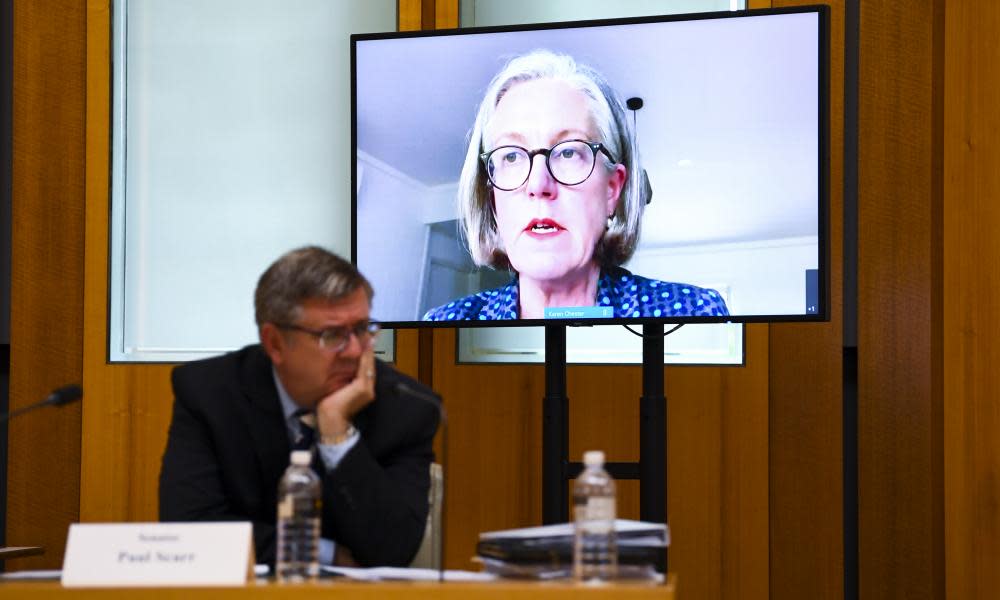Asic admits it acted at 'glacial' pace over rent payments to deputy chairman

The acting chair of the Australian Securities and Investments Commission, Karen Chester, has admitted to parliament that the regulator acted with “glacial” speed in dealing with concerns about rent payments to its deputy chairman, Daniel Crennan QC.
Last week the auditor general, Grant Hehir, told the treasurer, Josh Frydenberg, that payments of about $70,000 to Crennan and $118,000 to KPMG for tax advice it gave to the Asic chairman, James Shipton, breached public service pay rules.
Appearing before a Senate committee on Tuesday, Chester also confirmed that some of the advice KPMG gave to Shipton related to tax minimisation. Shipton has said he “acted properly and appropriately in this matter”.
Related: Asic deputy chairman resigns after $70,000 rental payment revealed
Shipton stood aside on Friday while Treasury investigates the payments and on Monday Crennan resigned. Both men have agreed to repay the money.
Documents tabled in parliament show the Australian National Audit Office raised concerns about payments for rent made to Crennan in August last year, when it was reviewing the regulator’s 2018-19 annual report.
The payments were made to help Crennan relocate from Melbourne to Sydney – something Crennan said on Monday he did at Shipton’s request.
In August last year the ANAO told Asic it should seek a ruling from the remuneration tribunal on the issue, but by last month this had not happened.
On Tuesday the committee chairman, Victorian Liberal senator James Paterson, put it to Chester that “nothing had been done” to deal with the problem since it was raised by the ANAO more than a year ago.
Chester said Asic tried to get a ruling on the payments from the remuneration tribunal, which oversees public sector pay.
However, the tribunal said it could not make a ruling on payments that had already been made, it required approval from the treasurer.
“I can see that it’s incredibly glacial in pace as to how it’s been dealt with,” she said. “There were ongoing discussions with Treasury, there was a briefing with Treasury.”
She said Treasury then asked Asic to obtain legal advice, which it did. “And by that time, we’re at the end of the financial year,” she said. “Mr Chairman, I’m not excusing how long this has taken.”
She said payments to Crennan continued throughout the process and did not stop until after September, when Asic received “final legal advice” and a draft letter from the auditor general setting out his proposed findings.
Crennan then requested that the payments stop, she said.
Asked by Paterson why the payment was “not immediately ceased” when the auditor general originally raised concerns, Chester said: “Mr Chairman, I think you are asking me a question that should be put to Mr Shipton.”
“I’ve explained the background, the context and the documentation and the chronology as I understand it, but it’s fair to say that we did not have the full information set.”
She said she also did not have a full understanding of why three separate payments of $25,000 each were made to KPMG in October 2018 for some of the tax advice it gave to Shipton.
“It could have been consecutive invoices as services evolved over time. I don’t really have a full understanding of why it was structured that way.
“Again, I look forward to that being some of the findings of the independent review.”
Related: Asic boss James Shipton stands aside as Treasury investigates $118,000 tax advice payment
Under questioning from Jenny McAllister, the Labor senator for New South Wales, Chester said that one of the invoices paid by Asic appeared to relate to minimising the tax Shipton paid on bank accounts held in a foreign currency.
“There are ways in which investments can be structured and timed to not avoid tax but to minimise tax, especially when it comes to foreign exchange matters, so I suspect that is what the KPMG invoice refers to,” she said.
KPMG also provided advice to Shipton over an unpaid tax bill from Massachussets, where he worked at Harvard immediately before joining Asic.
McAllister asked: “Do you think the Australian public would expect to pay with public money for these services – for minimisation of tax or resolution of late tax notices from another state in another country?”
“Do these things seem like reasonable expenses to be met by the public for the senior corporate regulator?”
“My short answer would be no,” Chester responded.
She said some of the key issues were whether the payments were reasonably related to Shipton’s relocation to Australia and whether they were an efficient use of public money.


